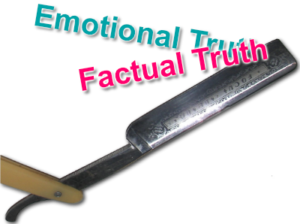Riding the Razor’s Edge
 Recently a writer asked me this question:
Recently a writer asked me this question:
“How can I turn my ideas into fiction? My short stories tend to be small slice-of-life sorts of things.”
This is something that I often run into in workshops and classes. People tell me they only write about true events. They don’t know how to stretch their imaginations to turn facts into stories. They’ve never learned the infinite possibilities behind that magical phrase, “What if?”
To turn ideas into fiction, take your true-to-life story elements and take them as far into what-if as possible.
The key to making a true story fictional is exaggeration. Make the events bigger than life – more conflict, more humour, more emotion. More colourful. Just…more.
You can also take two true-to-life stories and do a mashup. Try to figure out what would happen if they were combined. Fiction’s all about the “what-if” but the key to memoir is all about the emotional truth.
It depends on your purpose — why you want to write your memoir. If it’s for family, you’ll want to stay close to the truth, although what they know of the story may be wildly different from your own interpretation, since memories are not carved in stone and can change over time.
However, if it’s for a larger audience, sometimes strict adherence to facts must give way to the story’s emotional truth, and to do that, sometimes you need to exaggerate or alter certain elements — to save reputations, to make a point, to increase story conflict and narrative drive. Sometimes you need to change the timelines of events to expand or compress a storyline, and even insert events that at the time had nothing to do with the actual events as they happened, but are needed in order to make a story work.
 The squirrel thing in the story below is a good example of this. I feed the local squirrels every day and some of them are tame, even taking peanuts from my hands. My mother never fed them, but in order to make the story work, I needed to anchor the turning point and the moment of decision. The squirrels provided that.
The squirrel thing in the story below is a good example of this. I feed the local squirrels every day and some of them are tame, even taking peanuts from my hands. My mother never fed them, but in order to make the story work, I needed to anchor the turning point and the moment of decision. The squirrels provided that.
Writing a memoir isn’t always about perfect veracity. “Broken Promises” is about how I couldn’t bear to leave my home when my mother died. That’s the heart of it. I’ve changed timelines and identities, and inserted an event that happened at a different time, so this is a fictional story based on true events. I don’t have a sister and the situation was somewhat more acrimonious than I depicted it. But sometimes, you need to change identifying details to get to the emotional truth of a situation. I was less concerned with the real-life conflict than I was with the feeling and the themes of self-respect and self-integrity.
The story rides the razor’s edge between memoir and fiction. Identifying details have been changed but the emotional truth is based on fact.

Broken Promises
© 2021 Beverley Hanna
“Call me when everything’s wrapped up.” Susanna fidgeted with the car keys, impatient to leave.
“I will. I promise,” I said, wiping the tears. “Trust me.”
“You know what Mom always told us,” she said. “‘Never trust anyone who says, “Trust me.”’”
“Yeah, she did say that, didn’t she? God, I miss her.”
“No doubt you do,” she said, pursing her lips. Then, relenting slightly, she offered the obligatory hug and slid into Mom’s vintage Studebaker before starting the long drive west.
“Okay then,” she said. “See you in about three weeks.” She slammed the door and started the engine, which caught with a deep-throated rumble.
“See you then,” I whispered. The car’s crimson taillights sparkled and shimmered in the rainy dark as they rounded the corner and disappeared. I stood motionless, unable to summon up the energy to decide my next move.
Three weeks. I had only three weeks to write “finis” to an entire lifetime, and I had no idea where or how to start.
The funeral was over. The guests had come and gone, and my last remaining family member was even now on her way back to her perfect life with her perfect husband and her perfect kids.
I felt like one of those helium balloons two days after the party. Half-inflated, dragging on the floor, without purpose.
It was my own fault. I’d promised Mom.
When we first got the diagnosis, she’d begged me not to put her in a home. She wanted to spend her last days where she and my Dad had been happy, so for the past ten years, I’d cared for her as dementia stole away tiny pieces of her soul until nothing remained but an empty shell.
At the reception, everyone had said, “Oh, you’re a saint for taking such good care of her.”
Hah! What a load of steaming bullcrap. If only they knew what I really thought. I didn’t feel like a saint. I felt like a fraud. The bloody disease stole everything. Not just from Mom, who’d been my best friend, but from me. I’d had a life, dammit. I’d even had a nice little business and the dream of a future. And I resented the hell out of Mom for taking it all away. At times, I’d even hated her but how can you even say that out loud? My God! Whatever would they think — the ubiquitous “They” who so often dictate our behaviours? So it had been “stiff upper lip” all the way as the disease slowly destroyed us both.
And finally, when there was nothing left of the mother I’d loved, I gave up.
I broke my promise.
When she no longer remembered who I was, who she was or even how to swallow, she ended up in that home she’d dreaded because I simply couldn’t cope anymore.
I broke my promise, and she lasted only 2 weeks in that place. I think, somewhere in the depths of that poor, broken mind, she believed I’d let her down, and the guilt was killing me.
For several minutes, I stood in the rain, attempting to process — everything — the sheer chaos of my emotions, my current precarious living situation, my next steps and uncertain future. Finally, I just quit trying and stumbled back inside the little house where I’d grown up. I had one last night to spend in my own home, my sanctuary. The one safe place in the whole world that was entirely mine. And which I would have to start dismantling in the morning.
![]()
The following week was a whirlwind of activity – I called the realtors, lawyers and moving company, dealt with secretaries and bank officials, paid the funeral home, arranged for the appraisers and listed the house, all of which kept me from thinking beyond the next few minutes or the next few steps. But eventually, all the estate and legal stuff were done. All that remained was to sell the house. It was time to start packing up my personal items — those things I couldn’t bear to let go. The rest would go to auction. The movers would come to demolish my home on the very day I was to fly west, where I would stay with my sister until I got settled in a new place, surrounded by strangers.
I reached for Mom and Dad’s wedding picture on the mantel and stopped. Why am I doing this? I love this house. Susanna doesn’t. She only wants the money it will bring. I don’t want to leave.
With meticulous care, I placed the photo back on the mantel where it had stood for as long as I could remember. I wandered through the house, running my fingers over so many beloved pieces of my past — the sculpture of Brigadier the elephant, on whom I rode as a toddler until the day I broke his trunk, my grandparents’ tarnished silver tea service that hadn’t been used for years. And the leather-bound notebook Mom had given me after Dad died, and which I’d always thought was much too nice to write in.
Okay, so maybe I had lost family, career and security. Maybe I’d lost nearly everything that mattered, but for the first time in years, a new thought bubbled to the surface and I began to question what I wanted. What *I* wanted! Something for me. Just me.
I don’t think I can do what they want, I thought. How could I tear apart the home I loved? Memories surrounded me, peeking back at me from behind Mom’s home-made drapes where I’d hidden as a toddler, from the faint pink stain on the carpet where I’d spilled a glass of Welch’s grape juice when I was ten, from the kitchen doorway with the marks like tree-rings telling of my annual growth — happy memories, sad memories, funny incidents I’d almost forgotten.
I wanted my home. I wanted to stay right here and build a new life. My own life. One that wasn’t built on anyone else’s needs, whims or desires. One that was built on the bedrock of my past.
But to do that, I’d have to keep the house. Though Mom had left it to both of us, her will stated I had lifetime tenancy and her intent had been clear. She’d promised me I could stay in the home we’d both loved for as long as I wanted. Before the disease took her, she’d promised to take care of me, as I’d taken care of her.
But I couldn’t stay. I’d break my promise to my sister.
But I couldn’t leave. I’d break another promise to Mom.
This had been my home for over thirty years. My sister had never lived here. Not really. We’d moved into this house when I was little and Susanna was in her last year of high school. Six months later, she’d gone off to college, never to return. To her, the house was an expensive albatross. To me, it was home. Oh, it wasn’t anything special. A small bungalow, indistinguishable from thousands of others just like it, but it was my bungalow.
My three-week deadline came and went. Every day my sister called to remind me of my promise, but I just couldn’t bring myself to follow through.
“I need more time,” I told her, and I dithered, torn between my promise to Susanna and Mom’s promise to me.
![]()
It was such a little thing, really. I’d just put down the phone after Susanna’s latest call and stood gazing out the French doors at the rain weeping on the back deck. A sudden tap, tap, tap sounded on the glass at my feet. There was Mom’s tame squirrel, Smokey, scrabbling at the window, reminding me about his afternoon peanuts. A beautiful silver-grey colour with an extravagant tail, he came seeking his snack every day at 4:00 p.m. Even as Mom had faded into oblivion, I’d kept up the practice and I’d become very fond of the little guy. As I watched, a couple more showed up. He’d brought his family today, likely because of the rain.
Guilt struck hard. How could I abandon him? Who would feed him if I left? Smokey and his little family would starve.
I turned from the window, picked up the phone and cancelled my flight. I called the movers and the realty office and left a message for the realtor to cancel the listing. Then I tossed a handful of peanuts on the deck, eternally grateful for the little fellow’s intervention.
Within minutes, the estate agent screeched to a halt in the driveway. She marched up the sidewalk and confronted me as I opened the door and invited her in.
“What do you mean, you’re delisting it?” Clearly, the woman resented my decision. After all, she’d lose her commission if the house didn’t sell.
“I’ve decided to keep it,” I replied.
“Can you afford it? What will you do for money?” she asked. She knew my situation.
“There’s a bit of money from the estate. I’ll live on that while I figure out what to do.” I had some ideas, but it would take a lot more thought and planning before I could determine where life would lead. I couldn’t wait to get started.
“Well, do let me know when you change your mind,” she snarled and slammed the door. She flounced off to remove the For Sale sign from the front lawn.
“No,” I murmured. “I don’t believe I will,” and gently closed the door. I crossed to the side table by the window and picked up the precious notebook, opening it to the first page. Yes, I thought. Perfect! What better way to begin planning my new life? I curled up in the armchair which had been Mom’s favourite. For a moment I wondered, What would she want? but stopped myself. This would take some getting used to.
No, I thought. No, what do *I* want?
With exquisite care, on the first page of the notebook, I wrote down a new promise, a contract with myself:
I promise to live MY life on MY terms.
And I signed my name.
This was one promise I would keep.
![]()
I would love it if you’d scroll down and leave a comment. Let me know how you manage the delicate balancing act between the strict recounting of facts and a more imaginative style of storytelling. Do you have any special techniques that you use to make your memoirs more colourful and compelling?
Happy Writing!

Beverley Hanna
Trained as an artist in the late 1960’s and early 1970’s, I was one of the first creatives to be employed in the computer graphics industry in Toronto during the early 1980’s. For several years, I exhibited my animal portraiture in Canada and the U.S. but when my parents needed care, I began writing as a way to stay close to them. I’ve been writing ever since. I run a highly successful local writer’s circle, teaching the craft and techniques of good writing. Many of my students have gone on to publish works of their own. I create courses aimed at seniors who wish to write memoirs, with a focus on the psychology of creatives and the alleviation of procrastination and writer's block.
